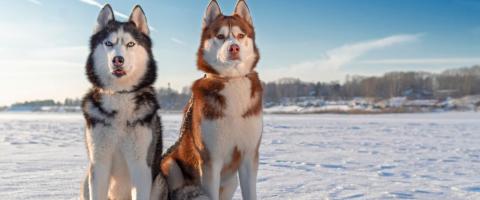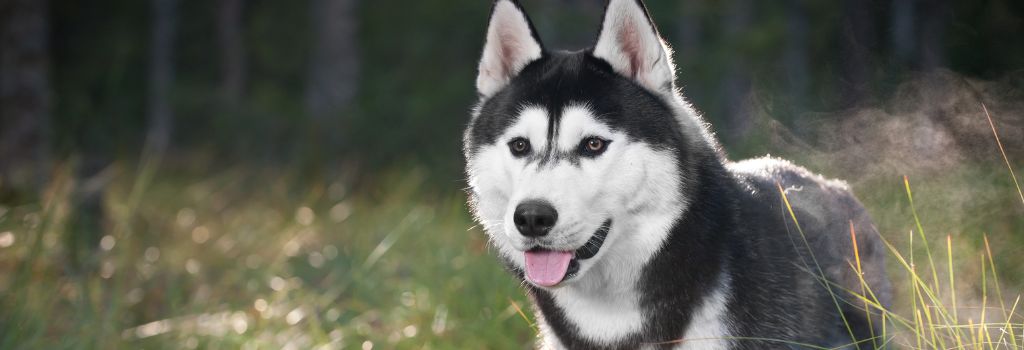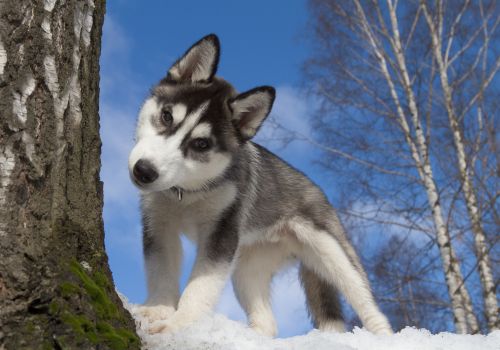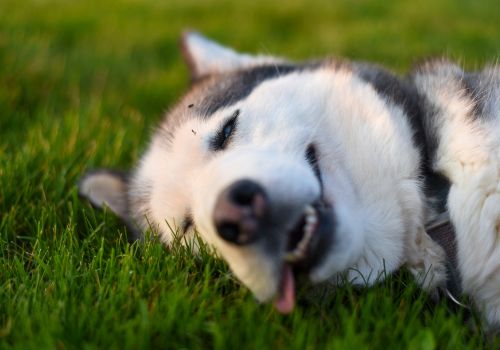
The Siberian Husky is an enigmatic and captivating breed that perfectly blends joyful playfulness with an independent spirit. If you're the adventurous type, this may be the ideal canine companion for your life journey.
A Personality That Shines
The Siberian Husky is a social butterfly, full of cheer and an outgoing disposition. They're known to be incredibly good-natured, gentle, and sensitive. If you have children, you'll find that Huskies are naturally accommodating and enjoy the energy that kids bring.
Eager to Please but Independent
While Huskies love to make their humans happy, they also possess a free spirit. This breed is eager to please but comes with a dash of independent thinking. They need consistent leadership and early socialization to bring out their best traits.
No Boundaries, Only Adventures
If you love exploring the great outdoors, a Husky will be your most enthusiastic travel companion. They possess a keen eye for adventure and are always ready to accompany you on your next journey, be it a hiking trip or a leisurely walk in the park.

Quirks and Challenges
Though they can be loving and charming, Siberian Huskies are not without their idiosyncrasies. They are prone to digging and may try to roam or escape if given the chance. Their prey drive is strong, making them a risk around smaller animals. Huskies also require a considerable amount of exercise to keep them happy and healthy; otherwise, they can become bored and anxious.
A Rich Historical Backdrop
Hailing from the cold regions of Siberia, this breed was brought to Alaska in the early 20th century as sled dogs. Bred by the Chukchi people for endurance and resilience against harsh weather conditions, Huskies have evolved to be clean, nearly odorless, and incredibly social. However, their amiable disposition makes them less than ideal as watchdogs.
Health and Longevity
Siberian Huskies are generally a healthy breed with a lifespan of 11-14 years. As always, a balanced diet, regular exercise, and consistent vet visits can help ensure a long, happy life for your arctic adventurer.
Unique Vocalizations
While not much of a barker, Huskies are known for their communal howls, especially when they're under-stimulated or simply want to "talk."
In summary, Siberian Huskies are a multifaceted breed filled with charm, energy, and a bit of independence. They make fantastic companions for those who can match their adventurous spirit and offer a fulfilling, loving home.

Genetic Predispositions for Siberian Huskies
The Windows to Your Husky's Soul: Eye Issues to Watch Out For
Your Siberian Husky's eyes are more than just mesmerizing; they're vital to his well-being! Just like their human pals, Huskies can suffer from a variety of eye conditions, some of which are painfully serious and could lead to blindness if not treated promptly. During each vet check-up, we make it a point to scrutinize those captivating eyes for signs of trouble.
- <Cataracts: Especially in older Huskies, cataracts can make the eyes look cloudy and obstruct vision. The silver lining? Many dogs adapt well to diminished eyesight, and surgery could also be an option to restore those baby blues—or browns.
- Glaucoma: This condition can be excruciating and progresses quickly. Signs like squinting, watery eyes, and a bluish tint to the cornea need immediate attention. If you see these symptoms, consider it an emergency and reach out to us or an emergency clinic without delay.
- Corneal dystrophy: This causes tiny white crystal deposits on the eye's clear outer layer. Although this issue is generally painless, it can obscure vision, and in extreme cases, surgery might be considered.
No Joking Matter: Bleeding Disorders in Huskies
Bleeding disorders in dogs come in varying degrees of severity. Some may not become apparent until your Husky suffers a significant injury or undergoes surgery. One such disorder, Von Willebrand's Disease, is often found in Siberian Huskies. Before any surgical procedure, we run tests to rule out this and other similar conditions. Better safe than sorry!
Seizures and Your Siberian Husky: What You Need to Know
Epilepsy is particularly unsettling because it’s not only about the seizures; it's about the toll they take on you and your pet. Huskies are among the breeds commonly affected by idiopathic epilepsy, which means the seizures have no identifiable cause. Usually appearing between six months and three years of age, seizures require prompt diagnostic work to determine their cause and appropriate treatment. Lifelong medication is typically needed, so be prepared for regular blood tests to monitor how well the treatment is working.
When Breathing Becomes a Chore: Laryngeal Paralysis
Imagine finding it hard to breathe, especially when you're excited or it's hot. Older Huskies sometimes experience larangeal paralysis, where their vocal cords slacken and obstruct the airway. Watch for signs like noisy breathing, particularly during exercise or hot weather, and bring your pet in for a check-up if you notice these symptoms.

High Blood Pressure: Not Just a Human Problem
Did you know your Husky could also suffer from high blood pressure? Yep, it's not just a human issue! Left untreated, hypertension could lead to severe conditions like blindness or even strokes. That's why we regularly check his blood pressure, and if necessary, medication can help manage it.
Listening to the Heartbeat of Your Husky: Heart Disease Concerns
Heart issues are something no pet parent wants to think about, but awareness is the first step in prevention, especially for breeds like Siberian Huskies that may be predisposed. These issues can range from structural defects to heart murmur concerns, so we take special care during each vet visit to tune into your fur baby's heartbeat. If we detect a murmur or if you've noticed symptoms like lethargy, coughing, a swollen belly, or even fainting, more specific tests will be lined up. Let's catch it early!
Your Husky's Golden Years: Addressing the Risk of Cancer
As dogs age, their risk for certain diseases like cancer naturally increases. Since Huskies often have longer lifespans than some other breeds, cancer becomes a concern in their golden years. The bright side? Many types of cancers can be treated if caught early, either through surgery or chemotherapy. So, when we say we're going to give your pooch a thorough exam, we mean it—we're looking for any early signs of lumps and bumps.
The Hippest Dog in Town: Understanding Hip Dysplasia
You might've heard of hip dysplasia, and unfortunately, it's pretty common among Huskies. It’s an inherited condition where the hip joints don't form properly, leading to arthritis. Signs include your dog having a hard time getting up or showing lameness in the hind legs. Early treatment can make a world of difference, so we'll use X-rays to catch it before it worsens. Remember, overweight dogs can suffer more, so keep that Husky physique in check!
The Gut-Wrenching Reality: Inflammatory Bowel Disease (IBD)
Inflammatory Bowel Disease is more than just an occasional upset stomach; it's a chronic condition where the gut lining gets inflamed with immune cells. The result? Your Husky might experience chronic vomiting or diarrhea. Stress or changes in diet can exacerbate the issue. If your dog's tummy troubles don't have an obvious explanation, it's time for a deeper investigation, possibly including an intestinal biopsy. Long-term management usually involves medications and dietary adjustments.
Struggling Steps: Degenerative Myelopathy
Degenerative Myelopathy is, in essence, the doggy version of ALS, and it's more prevalent in Siberian Huskies than other breeds. It starts as weakness in the hind legs and can progress to full paralysis. While there's no cure, some treatments like physical therapy and dietary supplements can help manage symptoms. If you're concerned, a genetic test is available to gauge your dog's risk.
Skin Deep: Autoimmune Skin Disease and Other Skin Issues
Pemphigus Foliaceus is an autoimmune skin disease more commonly seen in Siberian Huskies. It starts showing up around the age of four and manifests as crusts and hair loss, often around the nose and ears. Sunlight exacerbates it, so sunscreen is a must! Similarly, Huskies are prone to zinc-responsive dermatosis, which can lead to skin problems around the mouth, eyes, and ears. Proper zinc supplementation can usually manage the symptoms.

The Color Changing Husky: Uveodermatological Syndrome
Uveodermatological syndrome is an autoimmune disorder where the immune system attacks pigmented cells in the skin and eyes. This is especially common in Huskies and can lead to discoloration and even blindness. Like many skin issues, sunlight worsens the condition, so take precautions.
A Tiny Gland, Big Impact: Thyroid Problems
Low levels of thyroid hormones, or hypothyroidism, is common in Siberian Huskies. Symptoms range from skin and coat problems to weight gain and behavioral changes. A simple blood test can reveal the condition, and hormone replacement therapy is usually effective.
When It’s Not Just a Leaky Faucet: Bladder Disease
Ectopic Ureter is a condition where one of the small tubes connecting the kidney to the bladder is misplaced, leading to uncontrolled leaking of urine. Diagnosis involves imaging like X-rays or ultrasound, but once identified, surgical correction is usually effective.
All About Enzymes: Liver Enzyme Irregularities
Hyperphosphatemia refers to elevated levels of an enzyme called alkaline phosphatase (ALP) in the bloodstream. While it usually doesn't show obvious symptoms, it's still something to monitor. Elevated ALP could be a symptom of other serious conditions, so we make sure to rule out other issues before determining no treatment is necessary.
If you have questions and you'd like to reach out to us, you can call us directly at (856) 409-7179, or you can email us at [email protected]. Don't forget to follow us on social media Facebook, Instagram.

